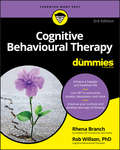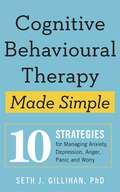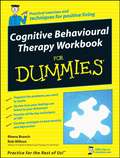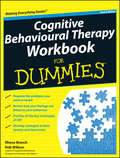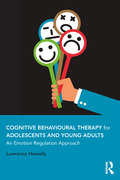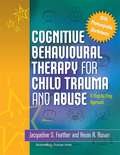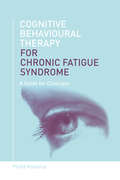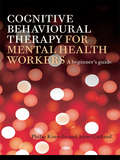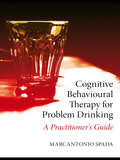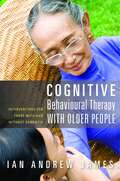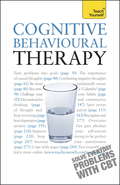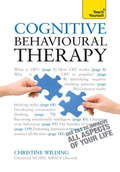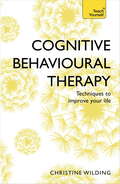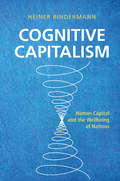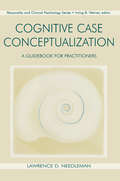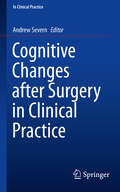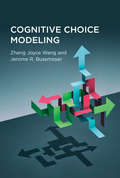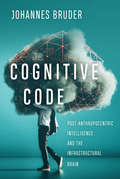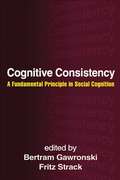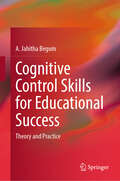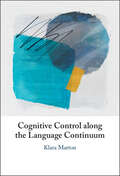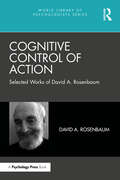- Table View
- List View
Cognitive Behavioural Therapy For Dummies
by Rob Willson Rhena BranchRetrain your thinking and your life with these simple, scientifically proven techniques! Cognitive behavioral therapy, or CBT for short, is often cited as the gold standard of psychotherapy. Its techniques allow you to identify the negative thought processes that hold you back and exchange them for new, productive ones that can change your life. Increasingly popular among healthcare professionals, the CBT approach can be used by anyone to overcome common problems ranging from depression or anxiety to more complex disorders like OCD, PTSD and addiction. CBT can also be used to simply developing a healthier, more productive outlook on life. This book shows you how you can easily incorporate the techniques of CBT into your day-to-day life and produce tangible results.. You’ll learn how to take your negative thoughts to boot camp and retrain them, establishing new habits that tackle your toxic thoughts and retool your awareness, allowing you be free of the weight of past negative thinking biases. Move on: take a fresh look at your past and maybe even overcome it Mellow out: relax yourself through techniques that reduce anger and stress Lighten up: read practical advice on healthy attitudes for living and ways to nourish optimism Look again: discover how to overcome low self-esteem and body image issues Whatever the issue, don’t let your negative thoughts have the last say—buy a copy of Cognitive Behavioral Therapy for Dummies and start developing your new outlook on life today!
Cognitive Behavioural Therapy Made Simple: 10 Strategies for Managing Anxiety, Depression, Anger, Panic and Worry
by Seth J. GillihanTEN SIMPLE STRATEGIES TO MANAGE ANXIETY, DEPRESSION, WORRY AND OTHER COMMON MENTAL HEALTH CONCERNS.Cognitive behavioural therapy is a proven form of psychotherapy that is often the first-line of treatment recommended for managing depression, anxiety, worry, and other common issues. Cognitive Behavioural Therapy Made Simple delivers a simplified approach to learning the most essential parts of cognitive behavioural therapy and applying them to your life.Written by licensed psychologist and bestselling author Seth Gillihan, Cognitive Behavioural Therapy Made Simple replaces workbook pages and technical language with quick and highly accessible cognitive behavioural therapy strategies that can be used on an as-needed basis.Presented with simple and straightforward language, Cognitive Behavioural Therapy Made Simple encourages readers to succeed with:- Practical explanations of 10 essential CBT principles: such as challenging negative thought patterns, behavioural activation, and overcoming procrastination, organized in a similar structure to in-person cognitive behavioural therapy- Supportive guidance: for creating goals and outlining strategies to help yourself meet them- Helpful self-evaluation sections: to help you track your progress and reflect on what you've learned using cognitive behavioural therapyFor people who are interested in realizing the proven benefits of CBT, Cognitive Behavioural Therapy Made Simple is a vital resource that will promote personal growth as you overcome challenges and improve your wellbeing.
Cognitive Behavioural Therapy Workbook For Dummies
by Rob Willson Rhena BranchDozens of practical exercises and easy to perform techniques for banishing negative thoughts before they take holdWhether you're trying to overcome anxiety and depression, boost self-esteem, beat addiction, lose weight, or simply improve your outlook, cognitive behavioural therapy (CBT) offers a practical, sensible approach to mastering your thoughts and thinking constructively. In this updated and expanded edition of the companion workbook to their bestselling Cognitive Behavioural Therapy For Dummies, professional therapists Rhena Branch and Rob Wilson show you, step-by-step, how to put the lessons provided in their book into practice. Inside you'll find a huge number of hands-on exercises and techniques to help you remove roadblocks to change and regain control over your life.Cognitive Behavioural Therapy Workbook For Dummies, Second Edition:Develops the ideas and concepts that presented in the bestselling Cognitive Behavioural Therapy For Dummies, Second Edition and provides exercises to put those ideas into practiceFeatures a range of hands-on CBT exercises and techniques for beating anxiety or depression, boosting your self-esteem, losing weight, or simply improving your outlook on lifeRhena Branch and Rob Willson are CBT therapists at the Priory Clinic in London, and the authors of Cognitive Behavioural Therapy For Dummies.
Cognitive Behavioural Therapy Workbook For Dummies
by Rob Willson Rhena BranchDozens of practical exercises and easy to perform techniques for banishing negative thoughts before they take hold Whether you're trying to overcome anxiety and depression, boost self-esteem, beat addiction, lose weight, or simply improve your outlook, cognitive behavioural therapy (CBT) offers a practical, sensible approach to mastering your thoughts and thinking constructively. In this updated and expanded edition of the companion workbook to their bestselling Cognitive Behavioural Therapy For Dummies, professional therapists Rhena Branch and Rob Wilson show you, step-by-step, how to put the lessons provided in their book into practice. Inside you'll find a huge number of hands-on exercises and techniques to help you remove roadblocks to change and regain control over your life. Cognitive Behavioural Therapy Workbook For Dummies, Second Edition: Develops the ideas and concepts that presented in the bestselling Cognitive Behavioural Therapy For Dummies, Second Edition and provides exercises to put those ideas into practice Features a range of hands-on CBT exercises and techniques for beating anxiety or depression, boosting your self-esteem, losing weight, or simply improving your outlook on life Rhena Branch and Rob Willson are CBT therapists at the Priory Clinic in London, and the authors of Cognitive Behavioural Therapy For Dummies.
Cognitive Behavioural Therapy for Adolescents and Young Adults: An Emotion Regulation Approach
by Lawrence HowellsCognitive Behavioural Therapy for Adolescents and Young Adults: An Emotion Regulation Approach provides a unique focus on therapeutic practice with adolescents and young adults, covering everything from psychological theories of adolescence to the treatment of common emotional difficulties. Beginning with a review of development through adolescence into adulthood, and the principles of CBT, the book highlights problems with traditional models of CBT for adolescents and young adults. In a fresh approach, this book separates CBT from diagnosis and grounds it instead in emotion science. Adolescents and young adults learn not about disorders and symptoms, but about emotions, emotional ‘traps’, and how they can use CBT to bring about change. There are chapters on fear, sadness, anger, emotion dysregulation, and happiness. Each chapter provides an outline of emotion science, a clear cognitive behavioural formulation (‘trap’), and evidence-based interventions. Clinicians are walked through the process using case illustrations. Cognitive Behavioural Therapy for Adolescents and Young Adults represents a transformation of CBT practice, and will become a valuable treatment manual to training and practising mental health professionals, especially psychotherapists specialising in CBT.
Cognitive Behavioural Therapy for Child Trauma and Abuse
by Jacqueline S. Feather Kevin R. RonanThe effects of trauma and abuse on children can be long-lasting, acute and damaging. Evidence suggests that cognitive behavioural therapy (CBT) is a highly effective form of psychotherapy to help children to overcome these effects. This book uses an evidence-based CBT treatment model to assist children and adolescents aged 9-15 years to resolve trauma symptoms and increase their coping skills. The approach is made up of 16 step-by-step sessions to carry out with the young person, and includes worksheets and fun activities using arts and crafts. The model uses four phases: strengthening the child's psychosocial context; enhancing their coping skills; processing their trauma through gradual exposure; and addressing special issues that the child may have and preventing relapse. The child keeps a scrapbook for the duration of the programme in which they keep worksheets, artwork and any other activities they carry out. The approach is designed for individual therapy but also includes sessions for parents and caregivers. With photocopiable worksheets and easy to follow sessions, this will be an invaluable resource for all practitioners working with traumatised and abused children, including therapists, psychologists, counsellors, health professionals and social workers.
Cognitive Behavioural Therapy for Chronic Fatigue Syndrome: A Guide for Clinicians
by Philip KinsellaChronic fatigue syndrome is a common and disabling condition characterised by fatigue, muscle pain, sleep disturbances and other physical and psychological symptoms that cause a considerable amount of distress and suffering. This book provides a practical guide for clinicians on how to treat chronic fatigue syndrome using cognitive behaviour therapy approaches.Cognitive Behavioural Therapy for Chronic Fatigue Syndrome attempts to make sense of the illness, and describes how cognitive behavioural therapy can help patients by working with their environment, emotions, and behaviour to improve their physical condition. Topics covered include:principles of cognitive behavioural therapyassessing patients with chronic fatigue syndromehelping patients with emotional issues and other maintenance factorsusing cognitive behavioural therapy alongside other approaches.Aimed at practitioners, this book will provide essential guidance for cognitive behavioural therapists, physiotherapists, occupational therapists, and other clinicians who work in this rapidly expanding field.
Cognitive Behavioural Therapy for Mental Health Workers: A Beginner's Guide
by Philip Kinsella Anne GarlandCan Cognitive behavioural therapy revolutionise your practice? Cognitive Behavioural Therapy is an effective and frequently used psychological treatment. Cognitive Behavioural Therapy for Mental Health Workers offers the reader a good overview of CBT, allowing them to develop an understanding of the patient’s problems, utilise the approach effectively, prepare for supervision, and integrate CBT skills into everyday practice. This clear, comprehensive introduction written by experienced clinicians, describes how to use CBT within the busy clinical environment. Subjects covered include: the therapeutic relationship in CBT treating anxiety disorders and depression developing further CBT skills utilising CBT in different mental health settings recent developments in practice. This straightforward guide will be essential for all mental health workers who are new to CBT, including nurses, occupational therapists, and counsellors as well as anyone training in mental health professions.
Cognitive Behavioural Therapy for Problem Drinking: A Practitioner's Guide
by Marcantonio SpadaThis book serves as a concise and practical guide on the application of Cognitive Behavioural Therapy (CBT) to problem drinking. Divided into five chapters it provides: a detailed account of the cognitive and behavioural processes involved in the development and maintenance of problem drinking in-depth coverage of assessment and case formulation and their role in planning and sequencing CBT interventions concise and practical illustrations of the application of CBT interventions in preparing, implementing and maintaining change diaries and worksheets for use with the client. Cognitive Behavioural Therapy for Problem Drinking is essential reading for all mental health practitioners in the field of alcohol misuse, as well as being a useful resource for those in training. The appendices of this book contain worksheets that can be downloaded free of charge to purchasers of the print version. Please visit the website www.cbtarena.com to find out more about this facility.
Cognitive Behavioural Therapy in Mental Health Care
by Alec Grant Michael Townend Ronan Mulhern Nigel ShortThis second edition provides an accessible and thorough overview of the practice of CBT within mental health care. Updates and additions include: - Revised chapters on the therapeutic relationship and case formulation - New material on personality disorders and bipolar disorder - New material on working with diversity - Content on the multidisciplinary context of CBT, the service user perspective, CBT from a holistic perspective - Developments within the cognitive behavioural psychotherapies - Continous professional development for the CBT practitioner - Photocopiable worksheets linked to case studies. Already a tried-and-tested guide for trainee psychologists and psychotherapists, as well as clinicians in mental health services and private practices, this text is also of value to practitioners who need refresher courses in CBT.
Cognitive Behavioural Therapy: CBT self-help techniques to improve your life
by Christine WildingUnderstand CBT is the best-selling guide to this hugely successful therapeutic model. It will give you a solid grounding in all the key ideas and techniques, as well as showing you how they can be applied in practice. Whether you need to get to grips with the essentials for a course, or just want to apply these proven techniques to your own life, this book is packed with practical examples and exercises to help you every step of the way.NOT GOT MUCH TIME?One, five and ten-minute introductions to key principles to get you started.AUTHOR INSIGHTSLots of instant help with common problems and quick tips for success, based on the authors' many years of experience.TEST YOURSELFTests in the book and online to keep track of your progress.EXTEND YOUR KNOWLEDGEExtra online articles at www.teachyourself.com to give you a richer understanding of CBT.FIVE THINGS TO REMEMBERQuick refreshers to help you remember the key facts.TRY THISInnovative exercises illustrate what you've learnt and how to use it.
Cognitive Behavioural Therapy: CBT self-help techniques to improve your life (Teach Yourself General Ser.)
by Christine Wilding"Cognitive Behavioural Therapy is now hugely popular, and as a self-help technique that has helped millions of people in the UK alone, and as an NHS-funded treatment for illnesses like depression. Teach Yourself: Cognitive Behavioural Therapy was one of the first and most successful books on CBT. This new edition shows how CBT techniques, which focus on using altered patterns of thinking to achieve goals and overcome problems, can make a major difference to your mentality.The first half of the book explains the background to CBT, what it is, and how to use it. The second half of the book gives examples of how you can use CBT to deal with specific issues, such as helping to overcome depression and anxiety, and boosting your mindfulness, resilience, assertiveness and self-esteem."
Cognitive Behavioural Therapy: CBT self-help techniques to improve your life (Teach Yourself General Ser.)
by Christine Wilding"Cognitive Behavioural Therapy is now hugely popular, and as a self-help technique that has helped millions of people in the UK alone, and as an NHS-funded treatment for illnesses like depression. Teach Yourself: Cognitive Behavioural Therapy was one of the first and most successful books on CBT. This new edition shows how CBT techniques, which focus on using altered patterns of thinking to achieve goals and overcome problems, can make a major difference to your mentality.The first half of the book explains the background to CBT, what it is, and how to use it. The second half of the book gives examples of how you can use CBT to deal with specific issues, such as helping to overcome depression and anxiety, and boosting your mindfulness, resilience, assertiveness and self-esteem."
Cognitive Behavioural Therapy: Evidence-based, goal-oriented self-help techniques: a practical CBT primer and self help classic (Teach Yourself General Ser.)
by Christine WildingTHE BESTSELLING GUIDE TO CHANGING YOUR LIFE WITH CBTCognitive Behavioural Therapy (CBT) is a self-help technique that has worked for millions and can work for you! It is regularly prescribed as a treatment for illnesses like depression, and recommended by healthcare professionals in dealing with issues from anxiety and eating disorders to stress and anger management.This bestselling, practical primer shows you how you can apply CBT techniques in your life and focus on using altered patterns of thinking to achieve goals and overcome problems. It explains what CBT is, how you can use it, and provides detailed examples that show you how to be more assertive, raise your self-esteem, and transform your mentality - becoming happier and more positive in the process. Now fully updated to cover the growth of third-wave approaches to behavioural therapy, including mindfulness, the new edition of this classic book will help you turn your life around.ABOUT THE SERIESPeople have been learning with Teach Yourself since 1938. With a vast range of practical how-to guides covering language learning, lifestyle, hobbies, business, psychology, and self-help, there's a Teach Yourself book for everything you want to do. Join more than 60 million people who have reached their goals with Teach Yourself, and never stop learning.
Cognitive Behavioural Therapy: Teach Yourself (Teach Yourself General Ser.)
by Christine WildingCognitive Behavioural Therapy is now hugely popular, and as a self-help technique that has helped millions of people in the UK alone, and as an NHS-funded treatment for illnesses like depression. Teach Yourself: Cognitive Behavioural Therapy was one of the first and most successful books on CBT. This new edition shows how CBT techniques, which focus on using altered patterns of thinking to achieve goals and overcome problems, can make a major difference to your mentality. The first half of the book explains the background to CBT, what it is, and how to use it. The second half of the book gives examples of how you can use CBT to deal with specific issues, such as helping to overcome depression and anxiety, and boosting your mindfulness, resilience, assertiveness and self-esteem.
Cognitive Capitalism: Human Capital and the Wellbeing of Nations
by Heiner RindermannNations can vary greatly in their wealth, democratic rights and the wellbeing of their citizens. These gaps are often obvious, and by studying the flow of immigration one can easily predict people's wants and needs. But why are there also large differences in the level of education indicating disparities in cognitive ability? How are they related to a country's economic, political and cultural development? Researchers in the paradigms of economics, psychology, sociology, evolution and cultural studies have tried to find answers for these hotly debated issues. In this book, Heiner Rindermann establishes a new model: the emergence of a burgher-civic world, supported by long-term background factors, furthered education and thinking. The burgher-civic world initiated a reciprocal development changing society and culture, resulting in past and present cognitive capital and wealth differences. This is an important text for graduate students and researchers in a wide range of fields, including economics, psychology, sociology and political science, and those working on economic growth, human capital formation and cognitive development.
Cognitive Case Conceptualization: A Guidebook for Practitioners
by Lawrence D. NeedlemanFor cognitive therapy to be successful, therapists must identify the key factors that contribute to their clients' problems. Effective cognitive case conceptualization necessarily precedes appropriate targeting and intervention selection. It requires the integration of the results of a comprehensive assessment into a strong conceptual foundation. Solidly grounded in recent research, and focusing particular attention on important new theoretical developments, this book first offers a comprehensive overview of the contemporary cognitive model of therapy. It then lays out detailed, easy-to-follow procedures for assessing within a cognitive framework, developing effective individualized cognitive case conceptualizations, and implementing state-of-the-art interventions based on them. A step-by-step guide for concisely summarizing and representing the salient features of a client's presentation is included. Extensive case histories bring to life the entire process of cognitive therapy--assessment, conceptualization, and intervention--for several clients with a variety of complex clinical problems: panic disorder with agoraphobia, obsessive-compulsive disorder, and chronic or recurrent major depressive disorder. Cognitive Case Conceptualization will become an indispensable desk reference for many experienced clinicians as well as trainees.
Cognitive Changes after Surgery in Clinical Practice (In Clinical Practice)
by Andrew SevernThis book reviews current knowledge about cognitive dysfunction in surgical patients to provide a common knowledge base and terminology. It covers the topic in a way that considers all points of view, and enables the reader to be better equipped to manage cognitive dysfunction in all its manifestations in surgical patients. This book will hopefully also be a source of generating future ideas for research.Cognitive Changes after Surgery in Clinical Practice has an internationally renowned group of authors, and is aimed firstly at the perioperative team: surgeon, anaesthetist and surgical ward nurses; secondly, the researcher or geriatrician; and thirdly, public health specialists and hospital managers.
Cognitive Choice Modeling
by Jerome R. Busemeyer Zheng Joyce WangThe emerging interdisciplinary field of cognitive choice models integrates theory and recent research findings from both decision process and choice behavior.Cognitive decision processes provide the interface between the environment and brain, enabling choice behavior, and the basic cognitive mechanisms underlying decision processes are fundamental to all fields of human activity. Yet cognitive processes and choice processes are often studied separately, whether by decision theorists, consumer researchers, or social scientists. In Cognitive Choice Modeling, Zheng Joyce Wang and Jerome R. Busemeyer introduce a new cognitive modeling approach to the study of human choice behavior. Integrating recent research findings from both cognitive science and choice behavior, they lay the groundwork for the emerging interdisciplinary field of cognitive choice modeling.
Cognitive Code: Post-Anthropocentric Intelligence and the Infrastructural Brain
by Johannes BruderAs the second decade of the twenty-first century draws to a close, the cultural, social, and economic effects of artificial intelligence are becoming ever more apparent. Despite their long-intertwined histories, the fields of neuroscience and artificial intelligence research are notoriously divided. In Cognitive Code Johannes Bruder argues that seemingly incompatible scales of intelligence – the brain and the planet – are now intimately linked through neuroscience-inspired AI and computational cognitive neuroscience. Building on ethnographic fieldwork in brain imaging labs in the United Kingdom and Switzerland, alongside analyses of historical and contemporary literature, Cognitive Code examines how contemporary research on the brain makes routine use of engineering epistemologies and practices. Bruder elaborates on how the question of mimicking human cognition and thought on the scale of computer chips and circuits has gradually evolved into a comprehensive restructuring of the world through "smart" infrastructures. The brain, traditionally treated as a discrete object that thinks, is becoming part of the larger thinking network we now know as "the Cloud." The author traces a recent shift in the goals of brain imaging to show that the introduction of novel statistical and computational techniques has upset traditional paradigms and disentangled cognition from its biological substrate. Investigating understandings of intelligence from the micro to the macro, Cognitive Code explains how the future of human psychology is increasingly determined by engineering and design.
Cognitive Consistency
by Bertram GawronskiThis volume provides an overview of recent research on the nature, causes, and consequences of cognitive consistency. In 21 chapters, leading scholars address the pivotal role of consistency principles at various levels of social information processing, ranging from micro-level to macro-level processes. The book's scope encompasses mental representation, processing fluency and motivational fit, implicit social cognition, thinking and reasoning, decision making and choice, and interpersonal processes. Key findings, emerging themes, and current directions in the field are explored, and important questions for future research identified.
Cognitive Control Skills for Educational Success: Theory and Practice
by A. Jahitha BegumThis book presents an exploration and application of cognitive control skills and their components. It discusses the role of the brain in the execution of cognitive control skills, and practical classroom strategies for teachers. Six main components of cognitive control skills such as working memory, attentional control, cognitive flexibility, self-regulation, inhibition, and meta-cognition are presented, with their importance for academic success highlighted. This book substantiates the assessment of each of the six main components of cognitive control skills<span style="font-variant-ligatures: normal; font-vari
Cognitive Control along the Language Continuum
by Klara MartonThis book provides a comprehensive review of the interactions between language and cognitive control in children. Broadening its scope beyond specific dimensions of language and cognition, it provides an extensive review of the dynamic changes in cognitive control along the entire language continuum. It integrates behavioral and neurophysiological findings from different disciplines, such as bilingualism, cognitive psychology, and communication disorders. A better understanding of the relationship between cognitive control and language in various speakers allows us to develop more sensitive experimental paradigms, as well as more efficient assessment and intervention methods. This title is part of the Flip it Open Programme and may also be available open access. Check our website Cambridge Core for details.
Cognitive Control of Action: Selected Works of David A. Rosenbaum (World Library of Psychologists)
by David A. RosenbaumIn the World Library of Psychologists series, international experts present career-long collections of what they judge to be their finest pieces—extracts from books, key articles, salient research findings, and their major practical theoretical contributions.In this volume, David A. Rosenbaum reflects on his distinguished career as an eminent scholar in the field of human perception and performance. Offering a unique perspective on the cognitive psychology of physical action control, the book charts Rosenbaum's development as one of the pioneers of the field.Featuring a newly written introduction in which the author offers a unique insight into his initial work on the movement precuing technique, along with coverage of other phenomena and models related to the translation of mental life into physical behavior, the book is essential reading for students and researchers interested in human perception, motor control, and embodiment.
